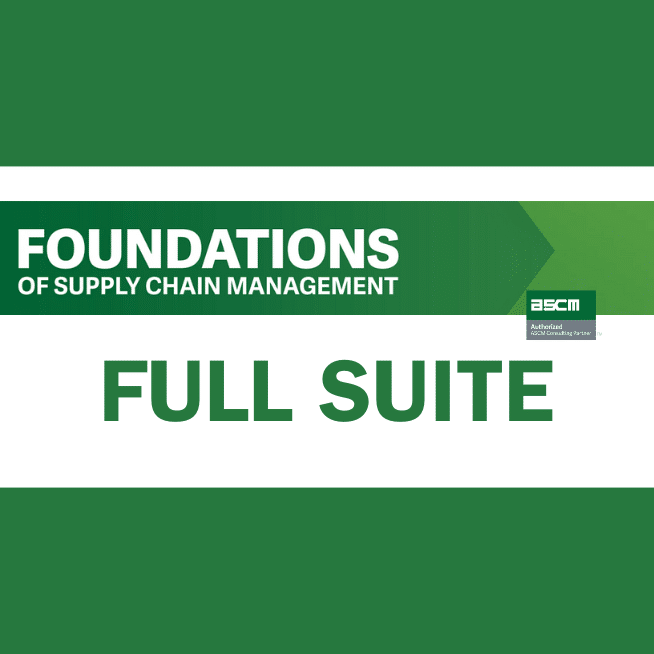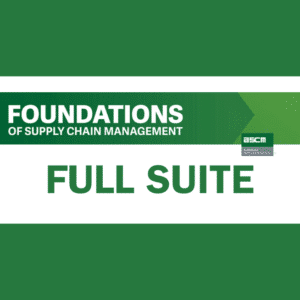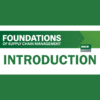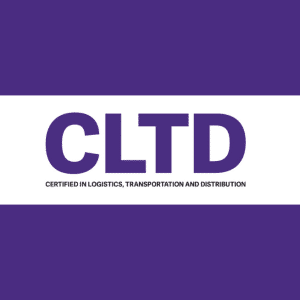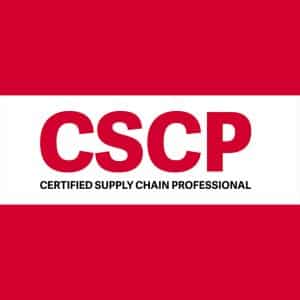What are ASCM Supply Chain Foundations?
A user-friendly, self-paced and modernized learning experience makes the Foundations of Supply Chain Management program motivating, engaging and attainable for beginner to mid-career professionals.
What topics are covered?
Introduction to Supply Chain Principles: The proper management of inventory, the planning process, manufacturing, distribution management, logistics, processes, and the purchasing function are fundamental to a successful supply chain. This course covers key concepts and terms to start building a working knowledge of the methods, techniques, and language of operations management and supply chain management. Specific topics include:
- Introduction to Distribution and Logistics
- Introduction to Manufacturing Management
- Introduction to Planning
- Introduction to Process and Operations
- Introduction to Inventory Management
- Introduction to Purchasing and Procurement
Inventory: Learn to explain how inventory objectives must be balanced with the needs of marketing, sales and finance. Discover the key decisions made by effective inventory managers. Gain knowledge of how inventory accuracy is maintained and apply that knowledge to make an impact. Specific topics include:
- Introduction to Inventory Management
- Purpose and Function of Inventory
- Inventory Replenishment Management
- Inventory Replenishment Techniques and Inventory Performance
- Lean Inventory — Theory and Practice
- Introduction to Purchasing and Procurement
- Sourcing Strategies
- Purchase Order Management
Distribution & Logistics: Learn why distribution channels are so important. Be able to describe different channel design models. Explain tradeoffs between different channel network designs, including customer response time, product variety, product availability and delivery time. Explore inventory management and its function in distribution and logistics. Specific topics include:
- Introduction to Distribution and Logistics
- Channel Network Design
- Distribution Inventory Management
- Distribution Requirements Planning
- Warehouse Management
- Packaging and Materials Handling
- Transportation Management
- Transportation Operations
Operations Planning: Learn how to create a business strategy. Work with a business planning model to develop a mission and vision. Explore the universal principles of forecast management. Define and understand demand management. Dive into the details of sales and operations planning. Specific topics include:
- Introduction to Planning
- Forecasting
- Demand Management
- Sales and Operations Planning
- Aggregate Operations Planning
- Master Scheduling Foundations
- Master Scheduling Processes
- Operations Systems
Manufacturing Management: Explore how manufacturing strategy informs manufacturing process choices. Describe the necessary elements for an effective product-structure-management process. Discover how manufacturing professionals determine needs using material requirements planning (MRP). Specific topics include:
- Introduction to Manufacturing Management
- Manufacturing Product Structures
- Basics of Material Requirements Planning
- Managing with MRP (PMM05)
- Capacity Planning and Management
- Production Activity Control
- Advanced Scheduling
- Lean Production Management
Managing Operations: Learn to describe how the management of processes and operations is affected by product volume, service requirements, variety, demand variation and visibility. Discover the principles of effective product and service design. Gain knowledge of valuable project management models that you can apply to projects and daily operations. Specific topics include:
- Introduction to Process and Operations
- Project Management
- Product Design and Development
- Process Design Strategies
- Total Quality Management
- Statistical Quality Control
- Process Improvement and Optimization
- Organizational Management and Performance
What is the course format?
Courses are delivered entirely online. Content includes readings, videos, and brain-boosting activities to help you retain your new knowledge. Learn on desktop, tablet or mobile — the interactive study tools are highly effective either way. You do not need to complete the full module in one sitting. Make progress in this course at your own pace.
*Requires ASCM Membership to access course content.
Per ASCM policy, learning system access, instructor training or any other components cannot be returned, refunded or transferred. Unchained value does not guarantee exam results. All courses require each attendee to have their own computer and mobile phone with internet access.
If your organization is a SCORM compliant Learning Management System and you would like to integrate this training, please contact us at [email protected] for more details and special pricing.

